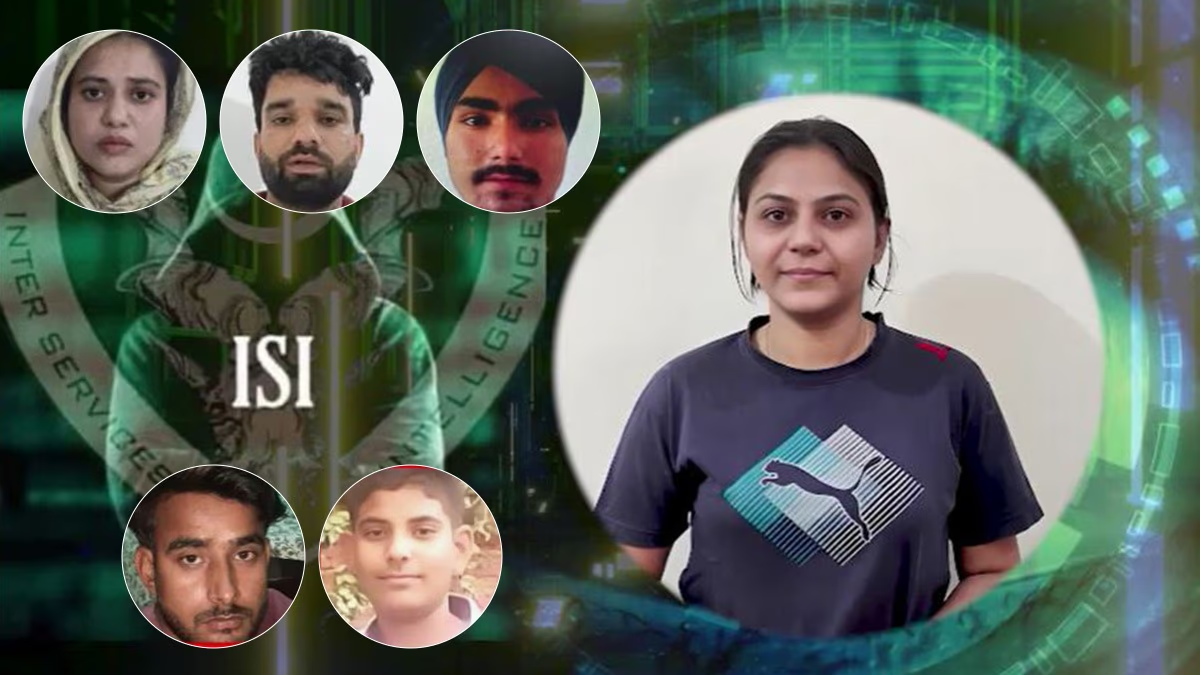Pakistani Spies Arrested in India:
Fresh revelations surface daily surrounding Jyoti Malhotra, arrested on charges of spying for Pakistan. A similar story follows Pakistani spy Devendra Singh. These are not the only individuals involved; in recent days, several spies have been detained by security agencies for betraying their own nation, spied for Pakistan while residing in India. Let’s delve into potential charges and penalties for those involved in such serious allegations.
Numerous Spies Caught in Ten Days
From May 8 to May 18, 2025, various Pakistani spies have been apprehended in India, including Jyoti Malhotra (Hisar, Haryana), Devendra Singh (Kaithal, Haryana), Ghazala (Malerkotla, Punjab), Yameen Mohammad (Malerkotla, Punjab), Noman Ilahi (Panipat, Haryana), Armaan (Nuh, Haryana), and Mohammad Murtaza Ali (Jalandhar, Punjab). All face serious accusations of espionage for Pakistan.
What Does the Law Say?
Those accused of spying for Pakistan can face legal action under the following provisions based on the Indian Penal Code (IPC) and other relevant laws. The Indian Penal Code has now been replaced by the Bharatiya Nyaya Sanhita (BNS) 2023, effective nationwide from July 1, 2024. Additionally, the Official Secrets Act, 1923, is applied in espionage cases. Here are the primary sections and potential penalties:
Section 152 - Bharatiya Nyaya Sanhita (BNS) 2023
This section covers sedition and activities against the state. It includes actions threatening India's sovereignty, unity, or security, such as espionage or acts in collusion with foreign powers against India.
Penalty:
A conviction under this section can result in life imprisonment or the death penalty, accompanied by fines.
Section 147 - Bharatiya Nyaya Sanhita (BNS)
This section pertains to waging war or involvement in activities aiding enemy nations through espionage.
Penalty:
Conviction can result in the death penalty or life imprisonment, along with fines.
Section 148 - Bharatiya Nyaya Sanhita (BNS)
If espionage includes plotting against India, this section may apply.
Penalty:
Conviction can lead to life imprisonment or up to seven years in prison, plus fines.
Section 3 - Official Secrets Act, 1923
Concerns espionage involving gathering, publishing, or passing secret information (like military or defense documents) with ill intent.
Penalty:
Up to 14 years in prison for defense-related espionage, with other cases facing up to three years.
Section 4 - Official Secrets Act, 1923
Involves communication or contact with foreign agents or suspects harmful to India's security.
Penalty:
Up to two years in prison for conviction.
Section 5 - Official Secrets Act, 1923
Involves unauthorized sharing or misuse of secret information.
Penalty:
Conviction can lead to three years of imprisonment or fines, or both.
Under the old laws, cases might be registered under IPC Section 120B (criminal conspiracy), Section 121 (waging war), and Section 124A (sedition), now included in BNS under sections like 152 and 147.
Penalty:
Conviction under Section 121 can result in the death penalty or life imprisonment, whereas Section 124A can impose up to seven years or life imprisonment.
Other Laws:
National Security Act (NSA), 1980: If espionage poses a serious security threat, preventive detention under this act may apply. Unlawful Activities (Prevention) Act (UAPA), 1967: If espionage is linked to terrorism, sections 16, 17, or 18 of UAPA may apply.
Penalty:
Convictions under these laws can range from seven years to life imprisonment. In some cases, the death penalty may apply.
Potential Sentences for Convicted Espionage
Serious cases (like leaking defense data or aiding war) may result in the death penalty or life imprisonment, with fines. Less severe cases (like sharing secret info or contacting foreign agents) may result in two to fourteen years in prison with fines or both.
Life Imprisonment
Under BNS and IPC, life imprisonment means the convict will spend life in prison, involving hard labor.
Fines
Many sections impose fines along with imprisonment. Failure to pay fines may lead to additional imprisonment.
The Case of Jyoti Malhotra and Others
In cases involving Jyoti Malhotra, Devendra Singh, and others, sections 3, 4, and 5 of the Official Secrets Act, along with BNS Section 152, are cited. Depending on the severity and impact of espionage, convictions could lead to up to 14 years under the Official Secrets Act, or life imprisonment/death penalty under BNS Section 152.




